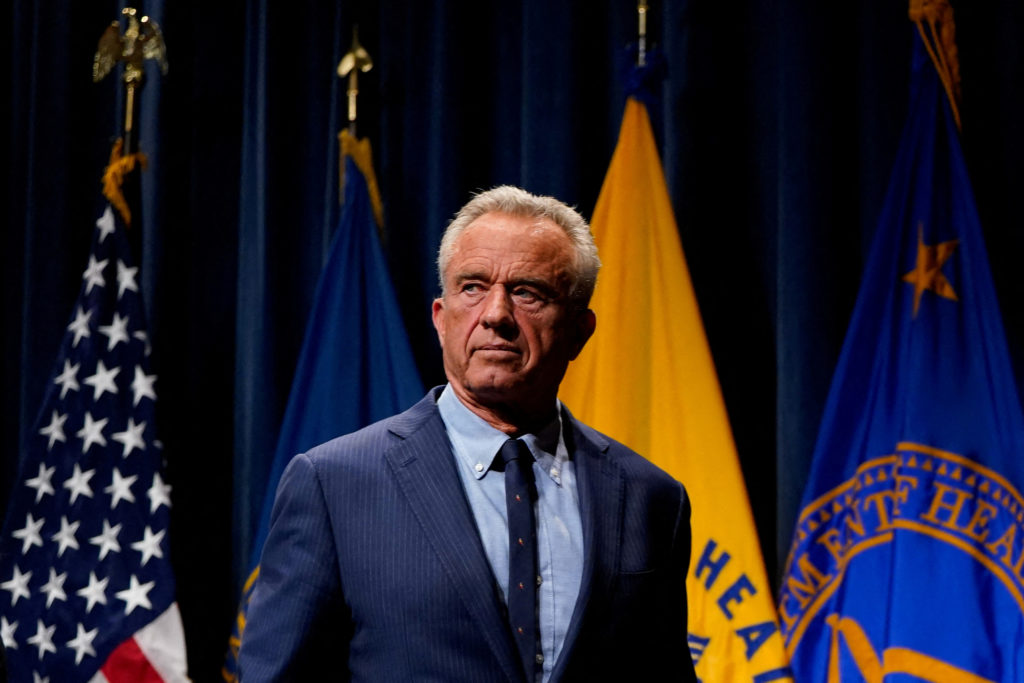NEW YORK – In a bold move, U.S. Health Secretary Robert F. Kennedy Jr. announced the appointment of eight new vaccine policy advisers on Wednesday, replacing a panel he had dismissed earlier this week. The decision has stirred significant debate among public health officials and medical experts.
Immediate Impact
The newly appointed panel includes individuals known for their critical views on COVID-19 vaccines and pandemic policies. Among them is Dr. Robert Malone, a former mRNA researcher who gained attention for his controversial statements during the pandemic. The panel also features Vicky Pebsworth from the National Vaccine Information Center and Dr. Martin Kulldorff, a co-author of the Great Barrington Declaration.
Kennedy stated, “We’re going to bring great people onto the ACIP panel – not anti-vaxxers – bringing people on who are credentialed scientists.”
Key Details Emerge
Kennedy’s decision to replace the 17-member Advisory Committee on Immunization Practices (ACIP) has drawn criticism from doctors’ groups and public health organizations. They express concern that the new panel may not uphold longstanding vaccination recommendations.
The new appointees also include:
- Dr. James Hibbeln, a former NIH group head focused on nutritional neurosciences.
- Retsef Levi, a professor at MIT specializing in operations management.
- Dr. James Pagano, an emergency medicine physician from Los Angeles.
- Dr. Michael Ross, an obstetrician and gynecologist based in Virginia.
Industry Response
The announcement has been met with skepticism from various quarters. Public health officials fear the new panel might align with Kennedy’s views, potentially altering the vaccination landscape in the U.S. The timing of the announcement is significant as it precedes the next ACIP meeting scheduled for late June.
Jason Schwartz, a Yale University health policy researcher, commented, “If you are to exclude any reputable, respected vaccine expert who has ever engaged even in a limited way with the vaccine industry, you’re likely to have a very small pool of folks to draw from.”
By the Numbers
17 – Members of the previous ACIP panel dismissed by Kennedy.
8 – New advisers appointed to the vaccine policy panel.
1964 – Year the ACIP was created to guide CDC vaccination recommendations.
What Comes Next
The upcoming ACIP meeting is expected to address vaccinations against flu, COVID-19, HPV, RSV, and meningococcal bacteria. The agenda has not yet been posted, but the federal notice indicates significant decisions are on the horizon.
As Kennedy’s new panel begins its tenure, the health community watches closely to see how these changes will affect public health policies and vaccination strategies moving forward.
Background Context
The ACIP, established in 1964, plays a crucial role in advising the CDC on vaccine use in the United States. Its recommendations are typically adopted by the CDC and form the basis of national vaccination programs. Kennedy’s recent actions mark a significant departure from traditional practices, raising questions about the future direction of U.S. vaccination policy.
The Senate confirmed Kennedy in February, following his promise not to alter the vaccination schedule. However, his subsequent actions, including the dismissal of the ACIP members, signal a potential shift in vaccine policy under his leadership.
Expert Analysis
Experts suggest that Kennedy’s appointments reflect his longstanding skepticism towards vaccines. The inclusion of individuals with critical views on vaccination underscores the potential for significant policy changes. This development builds on Kennedy’s previous statements questioning the alignment of the ACIP with vaccine manufacturers.
As the new panel prepares to convene, the broader implications for public health and vaccination efforts in the United States remain uncertain. The health community will be closely monitoring the panel’s recommendations and their potential impact on public health strategies.
